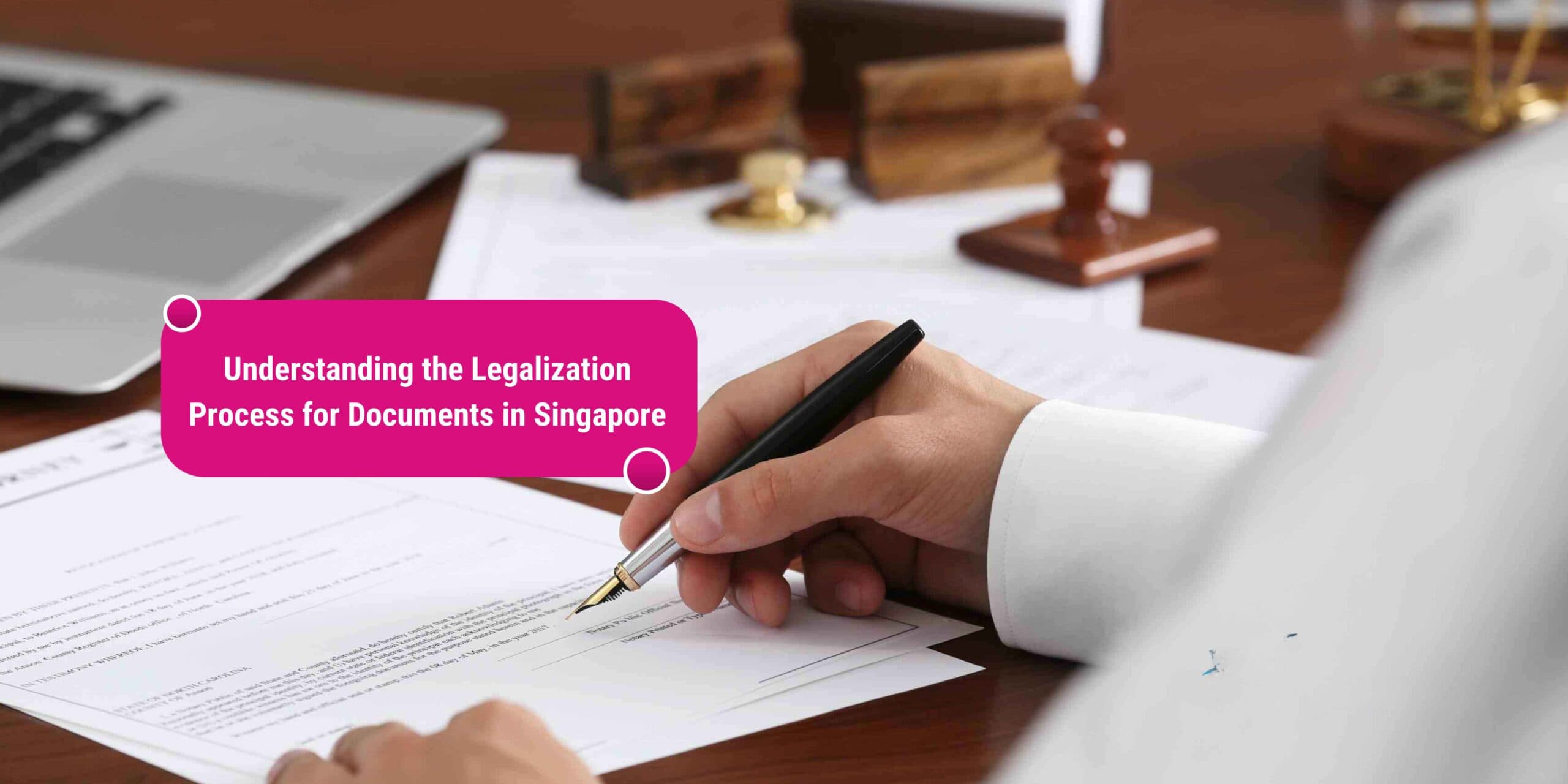The process of legalization of documents internationally is commonly referred to as the apostillisation process. The term apostille is commonly associated with the legalization of documents for member nations to the Hague Convention, although the process of legalization is generally regarded as ‘attestation’ in Commonwealth nations such as Singapore. The government of Singapore, through the Singapore Academy of Law, maintains a Register for the Purpose of the Hague Apostille Convention under Article 6(1) of the 1961 Hague Apostille Convention. It is important to ascertain the requirement of the country where the document will be used, to prevent any future inconvenience of re-authenticating an already apostillized document. Furthermore, such a search may also be useful to a business entity in identifying how their documents may be legalized or apostillized if they are dealing with foreign entities.
Understanding the legalization process for documents in Singapore is an area of focus for many who are not well-versed in such procedures. It could also encompass some who have to assist others in the process of understanding procedures. This portal has been created for the purpose of general guidance and to set one being started on the process of document legalization. Information contained within this guide is primarily based on personal experience and is not meant to be a definitive legal advice. Users of this guide should refer to specialists in this field for more definitive opinion.
Importance of Document Legalization in Singapore
In Singapore, the same process is necessary and document legalization is important because it enables these important documents to support the claims made by companies and individuals concerning these documents. Official documents are required in Singapore to be recognized as authentic and taken into legal effect or as evidence. Some of the most common are education certifications, which individuals can use in official employment, and other highly important personal transactions or events. Another instance is ‘Authentic Copy Certificates’ required to perform ROC transactions in Singapore. Whenever a client is requested to submit related documents (such as the overseas or foreign companies with which they do business) for corporate registration purposes, or for overseas authorities to verify their formal business documents such as shareholders, etc. Government agencies and/or financial institutions, tax authorities, etc. or where they are parties to formal business transactions, they must provide relevant certification of authenticity.
When handing in personal or company documents, such as education, financial or legal documents, in a foreign country for legal use, they must receive a type of certification or endorsement before they can be considered valid as public documents. For instance, it is not uncommon for students pursuing higher education overseas to enroll in a degree program after which they are required to submit documents such as their highest educational qualifications obtained (e.g. ‘O’ and ‘A’ Level certificates or diplomas) to foreign registration authorities or universities for the purpose of study, etc. Other types of companies or individuals may need to use court documents or business compounds (e.g. Certificate of Origin) in foreign countries for their commercial transactions. The process of obtaining such certifications from either embassies or notaries in Singapore on your documents for use in both foreign and domestic legal systems was referred to as the process of legalization.
Steps in the Legalization Process
- Certification: The final step is the legalization of Notaries Public signature and professional credentials through the local embassy or consular office. Please keep in mind that some embassies and consulates may have weekend days, public holidays, and country-specific days off on which they will not accept or issue documents notarization. Please check their judgment days or holidays before presenting consulate the documents for legalization.
- Authentication: The next step is the authentication of the signature of the Notary Public (including professional credentials) by the Singapore Academy of Law. The fee for each signature must be paid on delivery or may be prepaid.
- Notarization: Notarization or attestation by a Notary Public licensed in Singapore is required for certain documents. Notarization services are done through commission appointment to a Notary Public office or Notary Corporation where your presentation is made, your requisite fee is determined, and then your documents will be notarized/attested.
These are just generic descriptions and the current accepted procedures generally followed by most organizations in Singapore after being notified. The receiving organization determines any special instructions or procedure variations. Total time averages from ten working days to extreme emergency same day service in two to six hours. Call during local business hours only for your necessary assistance. There are at times cultural issues dealing with all nationalities which can be sensitive to simple requests, especially concerning personal financial conditions, document quality or performance requirements, and these are controlled through long-established guidelines and procedures under privacy policy or laws that are available solely to assist its member that has financial, legal, and administrative services to be performed in a timely manner.
Though the actual steps in the legalization process can vary depending on the documents being authenticated and by the fact that the regulations are subject to changes without prior notice, however, under normal circumstances, by whatever means necessary to ensure you understand the requirements for the documents you have.
Verification of Documents
- . For both documents and translations to be legalized, please read here for the instructions for verification and legalization of documents before you proceed to either 3.1a) or 3.1b). In the given link, please ensure that you tick the appropriate box to view the documents needed for the verification of Singapore-issued documents, foreign-issued documents, or translations of these documents.
- Documents in Bahasa Indonesia and Arabic are the exception since these are two languages Singapore recognizes and uses for some of its official purposes. Thus, translations into English for documents in these two languages are not needed. This is reflected in obtaining the relevant legalizations process, which is different for Arabic and Bahasa Indonesia documents.
- Documents that are written in a foreign language or in a dialect not commonly used in Singapore, such as Thai, Myanmese, Cambodian, and Lao, have to be accompanied by an English translation in order to be used for official purposes in Singapore. These translations also have to be verified and legalized.
Notarization of Documents
In conjunction with notarization, legalization may also be required. Some foreign destinations may require the documents to be presented and legalized by their respective Embassies or Consulate Generals and appointed officials of the Singapore Ministry of Foreign Affairs. Notaries generally work closely with the MFA when this is required. The Embassy can prepare the legalized documents in terms of specific country requirements. With respect to commercial transactions consisting of cross-border elements, the notaries, through their work involved, may help to create and establish a transparent business environment. Besides notarization services, Singapore notaries public are also called upon to engage in the preparation of last wills and testaments in languages other than English for non-residents, and they work closely with various parties to verify and authenticate the terms within such documents. In addition to the service, the Singapore Notarial Services is also fully committed to championing international anti-money laundering combat by working closely with various foreign enforcement agencies and respective legal professional bodies.
What is notarization and who are notaries public? A notary public is a public officer, and his services to the public are classified as an official affair. One of the primary duties of a notary is to authenticate the execution of various forms of documents from all over the world, ranging from single-page private documents to multi-document transactions created by overseas multinational firms. The documents include commercial and private transactions. In commercial transactions, notarized documents can involve proceedings or matters under the Foreign Limitation Periods Act, pulling out public records or registration of rights, attachment or enforcement of foreign judgment, and legal documents for foreign lawsuits or legal proceedings. In private affairs, notarized documents certify personal or family matters such as powers of attorney, passport certification, adoption, or decedent estates.
Notarization, as defined by the Notaries Act, involves the authentication of a conveyance, contract, or other assurance from within Singapore. A notarial act is the administration of an oath or affirmation, the taking of a declaration, the attestation of an instrument, the noting and certification of a protest for a dishonor of negotiable instruments, and the drawing or preparation of a mercantile document. The Notaries Public Act 1999 provides for the appointment of notaries public.
Authentication by the Ministry of Foreign Affairs
1. Original document signed correctly by the Mexican public official necessary
2. Philippine legal translation by official translator.
3. Philippine legal translation of the affidavit by official translator.
4. Mexican company legal translation by official translator.
5. Public deed (if applicable) and Philippine legal translation of it with the signature and notary public of the notary public who originally carried it out and the signature of the Treasury official who attached it to the legal document (according to current format).
6. Original and two photocopies of the valid identity document, and another copy of the passport of the signatory of the letter argument.
7. Fees: 8.40 USD per sheet, 8.40 USD per translation of the affidavit, 8.40 USD per translation of the company, 8.40 USD for public deed with translation, 16.05 USD in the case of submitting the application filed by the interested party and 321.00 USD in the case that the attorney presents it. Note: The total amount must be paid according to the exercises shown by the corresponding Treasury officer.
When you have checked, collect the following documents, which you will have to submit to the Legalizations and Legalizations Service of the MFA, located on the heights of Avenida Adolfo López Mateos:
Continue with your verification, following the steps below (Part 2 indicates 3 checkpoints where authentication can be done). If they have indicated to you that the Notary’s input is not legal and it is not worth using it, you can follow the steps that are shown below to carry out each verification.
As we continue to make progress, long-pending issues in the field of document processing are now being addressed to meet the needs of the business community as a whole. The events are coming to a close. In the event of a specific need, each client can benefit from additional information by contacting us directly or by attending our training sessions on the topic of validation in international trade, insurance more precisely. We are confident that by the middle of 2016, these events will have raised awareness on the opportunities gained and issues addressed in the document validation front, thanks to their services on offer and market feedback. legalisation of documents Singapore In conclusion, the legalization process for documents in Singapore is an important aspect of international trade and business operations.
In conclusion, Singapore is a signatory of the Hague Convention and has implemented legal procedures for documents issued in Singapore for use in a convention country. For countries that are not a signatory of the Hague Convention, the procedure requires the document to be executed by a Notary Public and subsequently, legalized by the Ministry of Foreign Affairs of Singapore. Documents executed outside Singapore are endorsed by the Foreign Embassy / High Commission / Consulate / Office of the country in which the document is to be used, located in Singapore. These processes require a great deal of time depending on the document type, destination country and the document-related time frame term of obligations. We offer bespoke services to validate trade-related and other cross-border documents by liaising with the relevant local, international local authorities on the client’s behalf enabling our clients to focus on their core business whilst ensuring their requests are taken care of.



